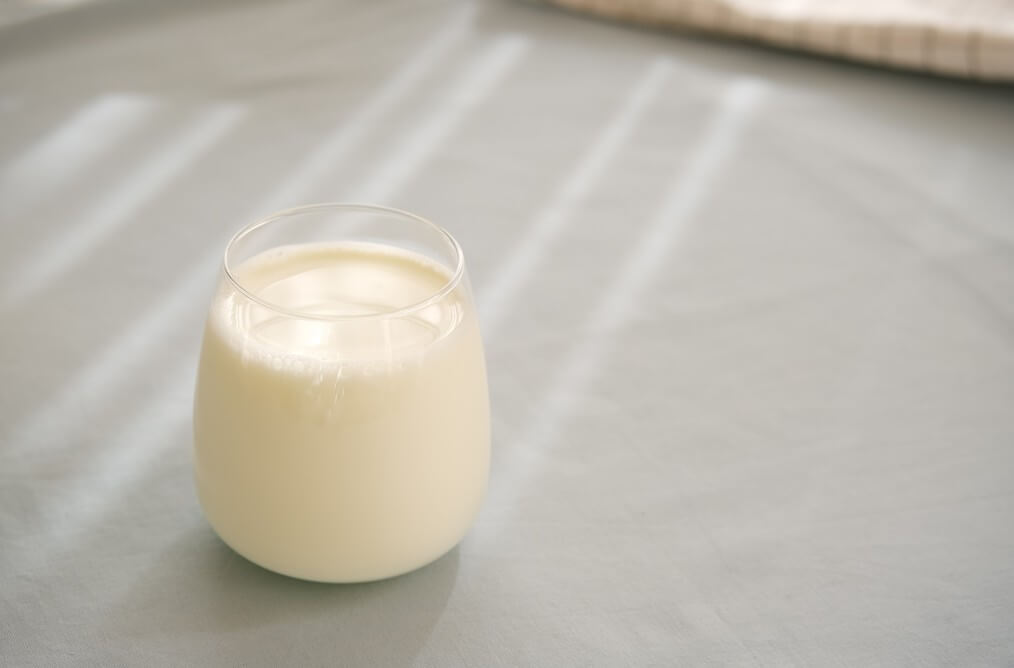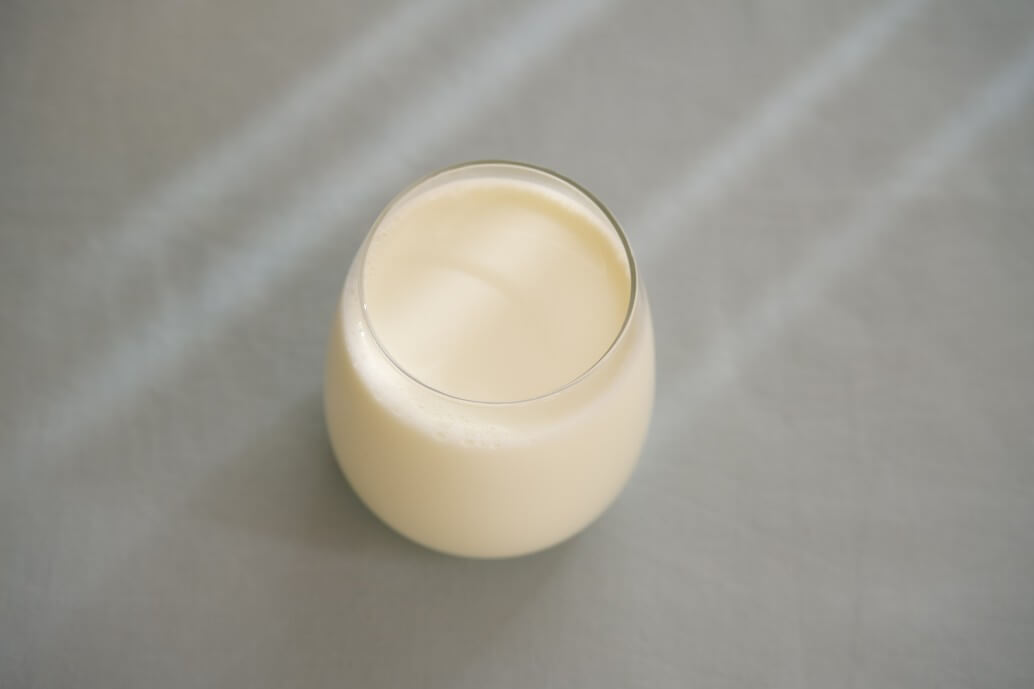Walnut Milk
Blood Sugar
Walnut milk is low in sugar and carbs, and high in healthy fats.
Gut Health
Walnuts contain healthy bacteria to improve your gut health.
Brain Health
Walnuts contain omega-3 fats, which can improve brain health.
Walnut milk is a great alternative to traditional dairy milk. It's low in calories, has protein and calcium, and has no cholesterol!
It can be used as a base for smoothies, sprinkled into cereal, drizzled on granola or simply poured over some hot cereal.
If you're interested in learning more about this plant-based milk, this article will give you all the information you need about walnut milk!
What is Walnut Milk?
Ah, you got us - walnuts aren't technically a nut, but rather the seeds of the walnut stone fruit. In this way, it's similar to its almond and cashew cousins, also classed as seeds. And like other botanical seeds, they're packed full of healthy fats that make for a light and creamy milk.
Walnut milk is a dairy- and lactose-free milk replacement. Almond milk and cashew milk might have stolen the limelight for a number of years. But now people are choosing walnut milk for its superior flavor and nutritional perks.
So, how do you milk a walnut? The answer is, it's not as hard as you think!
First, walnuts need to be soaked. This softens them and plumps them up as they absorb water.
Next, the liquid milk is separated from the solid nut by blending the nuts with water.
The resulting mixture is then poured into a nut milk bag, which catches the pulp, leaving you will pure, smooth walnut milk.
Homemade vs. Store-Bought Walnut Milk
The taste and texture of walnut milk will vary widely depending on whether it's store-bought or homemade.
If you opt for the readymade kind, note that each brand will taste and feel different on your tongue, so try a few and choose your favorite.
You'll also want to check if there are any additives like preservatives or sugar in branded milk, in case you're trying to avoid them.
Homemade walnut milk won't last as long as store-bought; it'll keep in the fridge for up to five days. But as it's so delicious and can be used in endless recipes, we don't think it'll hang around that long.
Homemade walnut milk will often be creamier because it's been made fresh. You can change up the thickness of your milk by adding more or less water to a batch.
Using less water equals thicker, more luxurious milk. More water leads to thinner milk. If you're on a budget, adding more water to your walnut milk recipe can also help make your money go further.
- Walnut Milk Taste: Walnut milk has a buttery, distinctly nutty flavor. Milk from raw nuts has a milder taste. Milk from roasted nuts will have a nuttier, toasted flavor.
- Walnut Milk Texture: Walnut milk has a creamy, smooth texture.
Walnut Milk Nutrition Facts
Here are the nutrition facts for 1 cup of walnut milk, according to the USDA.
Walnut Milk Nutrition Facts | |
|---|---|
Calories | 120 |
Protein | 3g |
Fat | 11g |
Carbohydrates | 1g |
Fiber | 0g |
Sugar | 0g |
Calcium | 24mg |
Potassium | 77mg |
The Benefits of Walnut Milk
So, why choose walnut milk over another nut milk? Here are some walnut milk benefits you won't want to miss.
Lactose-Free
To digest lactose in dairy, your small intestine needs to make the digestive enzyme lactase.
Some people can't produce enough lactase, leading to lactose intolerance.
Lactose intolerance causes symptoms like bloating, gas, nausea, diarrhea, and stomach ache.
Walnut milk is plant-based, and therefore completely lactose-free. So if you're lactose intolerant, walnut milk is an excellent choice.
Supports a Vegan Lifestyle
More people have adopted a vegan lifestyle, which eliminates all dairy products. People choose to go vegan for many reasons, including concerns over damage to health, animals, and the environment.
Dairy creates a huge environmental footprint and has the highest global-warming potential.
Plant foods, on the other hand, have the lowest effect on global warming. So walnut milk is a great choice for vegans and those who want to minimize our impact on the environment.
Rich in Antioxidants
Free radicals are unstable atoms in the body that can cause cell damage through oxidative stress. This stress can cause aging and sickness, including diseases like diabetes and cancer.
When there are too many free radicals in our body, this leads to oxidative stress and illness.
The way to bring those levels into balance is through antioxidants, like vitamins C and E. Our bodies make some antioxidants, but we can boost our levels through foods, including walnuts and walnut milk.
Walnuts have a much higher antioxidant potency than other nuts. That includes favorites like almonds, pistachios, Brazil nuts, and pecans. This means a regular glass of walnut milk may help prevent chronic disease, and even slow down aging.
High in Omega-3s
We need unsaturated Omega-3 fats to maintain good brain health. As our body doesn't produce its own Omega-3 fatty acids, we need to get them through food.
Omega-3s support blood flow to the brain, which is needed for proper memory function. They also improve cognitive processes and can even fight depression.
Walnuts contain the highest levels of Omega-3s of all nuts and are a brilliant source of these essential fatty acids for your diet.
Aids in Good Gut Health
Our gut microbiome, or the variety of bacteria living in our gastrointestinal tract, is vital to keeping us healthy. A diverse microbiome full of good bacteria supports digestion, our immune systems, and can even control our weight.
The good bacteria in our gut love plant-based foods. Researchers have found that a daily intake of walnuts helps to increase these good guys, and keep our guts in tip-top shape.
Promotes Stable Blood Sugar Levels
The lactose in dairy milk is a sugar, and this sugar can raise blood glucose levels.
While full-fat milk has a lower impact on blood sugar, low- and zero-fat dairy milks have a higher sugar ratio. This is a concern for diabetics and others who struggle with blood sugar control.
Plain walnut milk is low in sugars and carbohydrates, and high in healthy fats. This means it won't impact your blood sugar levels and can even lower the overall insulin response for your whole meal.
May Help You Lose Weight
Because walnuts contain essential fats, walnut milk can help you feel fuller for longer. This effect helps to control hunger pangs and keep snacking at bay.
And as we already mentioned, walnut milk can also help support a healthy microbiome, which controls a lot of our cravings.
When we have more healthy bacteria, our cravings for unhealthy, sugar-laden foods are reduced. We also start to crave healthier foods, which lead to a happy gut, and so the cycle continues.
The Downsides of Walnut Milk
While walnut milk is an excellent food source and promotes good health in most people, there are some downsides.
Low in Fiber
When we look at walnut milk vs. almond milk, almond milk is higher in fiber and lower in calories.
So, if you're trying to increase your fiber intake, walnut milk won't be able to do that.
You can, however, add a source of fiber - like chia seeds - to your walnut milk, and boost your fiber count that way.
Not for Those With Nut Allergies
While some people are lactose intolerant, others have nut allergies. If this is you, then walnut milk is probably out.
Check with your doctor and allergy specialist whether walnuts are an option for you. If not, you may want to opt for non-nut milk options like oat or rice milk.
Less Available Than Other Nut Milk
The spotlight has been on options like almond milk, coconut milk, and cashew milk for years, so there's a huge supply of them out there.
Conversely, as walnut milk is a relatively new kid on the block, it can be harder to find in stores.
The great news, though, is that walnut milk is easy to make!
How To Make Walnut Milk
Want to know how to make the perfect walnut milk every time, whenever you want it? Here we go.

Ingredients
- 2 cups raw (or toasted) walnuts
- 4 cups filtered water
- Pinch of salt
- Extra water for soaking
Equipment Needed
- Medium-sized bowl
- High-speed blender
- 1 nut milk bag, or fine mesh strainer and cheesecloth
- Large bowl or jug
Instructions
Step 1
Place the walnuts and salt into the medium-sized bowl, and fill with water until it covers the walnuts by 1 inch. Soak for 12-24 hours. The salt serves to activate the nutrients in the walnuts, and the longer they soak, the creamier the milk.
Step 2
Drain and rinse the walnuts, and add them to your high-speed blender. Add the 2 cups of filtered water, and blend on the highest setting. You're watching for a white, frothy liquid - this will take 3-4 minutes.
Step 3
Set your nut milk bag over the large bowl or jug, and pour the walnut milk through it.
Alternatively, place your fine mesh strainer over the bowl or jug, and lay the cheesecloth inside it. Once you've poured in the milk, squeeze the remaining liquid out of the nut milk bag or cheesecloth into the jug.
The ratio of nuts to water is 1:2. So, as long as you have double the water as you have walnuts, you're good to go. Process the nuts in batches for larger quantities.
This recipe is for plain, unsweetened walnut milk, but you can spice it up with all sorts of ingredients.
For sweetened walnut milk, add some dates before blending. And cinnamon adds a little kick that not only tastes great but will enhance walnut milk's gut-healthy properties, too.
Walnut Milk Recipes
You've made your rich, creamy walnut milk, but now how to use it?

Walnut Milk Chai Chia Porridge
For a delicious, healthy, and hearty breakfast option, you'll want to give this walnut milk chai chia porridge a try. The addition of cacao dust and bananas makes for a flavor bomb that'll wake you right up.
Creamy Walnut Spaghetti Sauce
A creamy, garlicky, cheesy sauce is everything you want in a comforting pasta dish. This walnut spaghetti sauce is perfect for hunkering down in front of the fire with a bowl of pasta and a glass of wine.
Walnut Ice Cream
You're going to love this easy and delicious recipe! Throw some dates into your regular walnut milk recipe, and you'll have luscious walnut ice cream in no time.
Chocolate Walnut Cake
If you're looking for a dairy-free showstopping cake, then this chocolate walnut cake is the way to go. With its multiple layers and stunning presentation, your walnut milk will be the star of the show.
Healthy Walnut Hot Chocolate
Hot chocolate is a warming, luxurious treat, and the perfect way to showcase your walnut milk. Its luscious mouthfeel, paired with the richness of cocoa powder and chocolate chips, makes this walnut hot cocoa one you don't want to miss.

Walnut Milk FAQ
What Is Walnut Milk Good For?
Because it's lactose-free and low in sugar, walnut milk is a great alternative to dairy and non-dairy milks. It is low in carbs and high in healthy fats, so is useful for those on a diabetic, vegan, or low-carb diet.
Can Walnuts Be Used for Milk?
Used straight, you can substitute walnut milk whenever you'd use milk. Use walnut milk on cereal, in coffee and tea, or drink it neat as a beverage. You can also substitute walnut milk in a number of recipes. It heats up well and adds a creamy flavor to dishes.
Is Walnut Milk Easy to Digest?
As long as nuts aren't an issue for you, then walnut milk should be easy to digest. Soaking the nuts before blending neutralizes some of the compounds that can cause things like gas and bloating. Because of this, walnut milk can be easier to digest than whole walnuts alone.
Is Walnut Milk Good for You?
Walnut milk is packed full of nutrients, like antioxidants and Omega-3 fatty acids. It can increase your good gut bacteria, slow aging, and help you avoid chronic diseases like diabetes.
Give Walnut Milk A Try
What is walnut milk, then? Walnut milk is a great dairy-free nut milk alternative. If you're lactose-intolerant, living a vegan lifestyle, or just want to change up your milk options, why not give walnut milk a whirl?
It's full of health-boosting benefits, is a sustainable alternative to milk, and it's better for the planet. We know that once you've tried it, you'll be reaching for the walnut milk again and again.
If you're interested in exploring other types of non-dairy milk, take a look at our other guides below!

